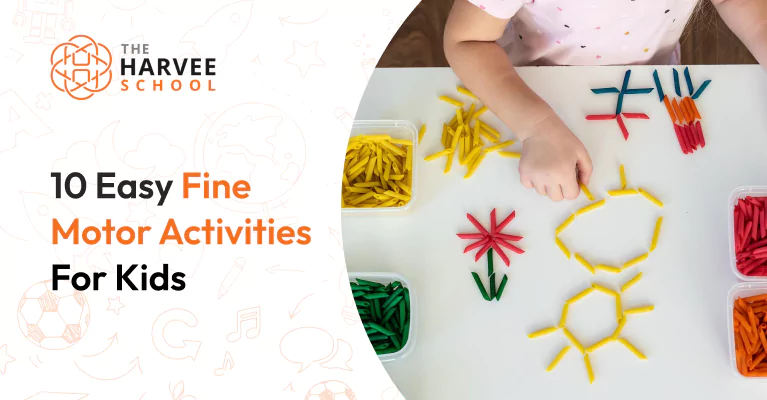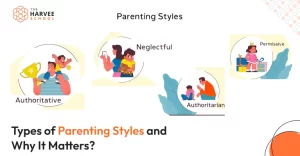10 Easy Fine Motor Activities For Kids
We eat, pick small objects, hold pen/pencil, tie our shoelaces and use our toes to balance on a stone. We all could easily do these activities without any external support. These tasks involve a complex integration of small muscle movements in our fingers, hands, feet, toes and are collectively called as fine motor skills.
Fine motor skills are crucial for a child’s development, as they help build coordination, strength, and dexterity, all of which are essential for daily activities and academic success. Developing fine motor skills in early childhood sets the foundation for more complex tasks in the future, such as typing, playing musical instruments, and even sports.
Why are Fine Motor Skills Essential?
Incorporating fine motor activities into your child’s daily routine can benefit their overall development. These activities help strengthen hand and finger muscles, improve hand-eye coordination, and build confidence and independence in everyday tasks.
Neglecting these skills can lead to difficulties in performing basic tasks, resulting in frustration, delays in academic progress, and reduced social interactions, ultimately impacting your child’s confidence and independence.
10 Easy Fine Motor Activities For Kids
Here are some general daily fine motor skills activities that can naturally help children develop fine motor skills while participating in everyday tasks:
1. Pouring Drinks
Allow your child to pour water, juice, or milk into a glass as it helps them to develop hand-eye coordination and control over hand movements.
2. Sorting Groceries
Ask your child to help sort groceries by category (e.g., fruits, vegetables, packed goods). Picking up and organizing items of various sizes help them to improve their hand-eye coordination and fine motor control.
3. Peeling Fruits and Vegetables
Peeling fruits like bananas, oranges, or even vegetables like carrots is an excellent way to strengthen the small muscles in the fingers and hands. Supervise closely to ensure safety while using sharp objects in the kitchen.
4. Stirring and Mixing
Let your kids assist you in the kitchen. Give them small tasks like mixing, kneading dough and breaking eggs. These actions require coordination and control, making them great fine motor exercises.
5. Buttoning and Zipping Clothes
Encourage them to button their shirt or zip up their jacket. This builds dexterity and strengthens their hand muscles, preparing them for more complex tasks like tying shoelaces.
6. Washing Dishes
Allowing your child to accompany you in washing plates and utensils. Giving them non-breakable dishes or utensils under supervision is a great way to develop fine motor skills through the repetitive motions of scrubbing and rinsing.
7. Opening and Closing Containers
Let them open and close containers, such as jars or lunchboxes. It helps them improve grip strength and hand coordination.
8. Laundry Clip Holding
Laundry clips, or clothespins, are excellent tools for developing fine motor skills in children. The pinching motion required to open and close the clips helps strengthen the small muscles in their hands and fingers. You can involve your child while drying clothes by letting them pin the washed clothes using the cloth clips.
9.Spraying and Wiping Surfaces
Using a spray bottle to clean surfaces, followed by wiping them with a cloth, is an engaging activity that enhances fine motor coordination and muscle strength. The actions of pressing the spray trigger and moving the cloth in controlled motions require precise hand movements, making this a practical and enjoyable way for children to develop their fine motor skills while helping around the house.
10. Turning Pages in a Book
Encouraging your child to turn the pages of a book while reading together helps develop precision and control, especially in their finger movements. This simple yet effective activity strengthens fine motor skills as your child learns to handle pages with care, improving their dexterity and coordination in a relaxed and enjoyable setting.
Playful Fine Motor Activities For Preschoolers
Other activities of fine motor skills include stringing beads, cutting shapes out of paper with safety scissors, building blocks and molding playdough into various forms. Children can also enjoy using tweezers to pick up small objects, threading paper or stickers onto a string, or even squeezing sponges in water play. Simple tasks like peeling stickers off a sheet, playing picture puzzles, sorting coloured toys, picking up spilled beads, building crafts using clay molds can also turn into exciting challenges that strengthen their little fingers.
Remember to gradually include these activities to build consistency and regularity. Incorporating these simple daily activities into your child’s routine will not only make them feel like they’re contributing to household tasks but will also support the natural development of their fine motor skills in a practical and enjoyable way. It can also set a stage where they take initiative and responsibility in handling household chores effectively in future.
To Conclude
Introducing simple tasks into your child’s daily routine offers more than just practical benefits. These activities are instrumental in enhancing hand strength, coordination, and precision, which are crucial for fine motor skill development.
Beyond physical improvements, these tasks provide valuable learning experiences that develop a sense of independence and build confidence. This approach makes routine chores more engaging and meaningful, turning ordinary moments into opportunities for growth and skill-building.






